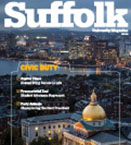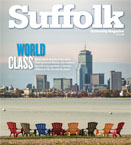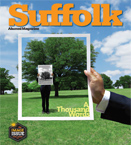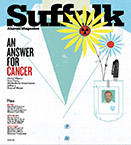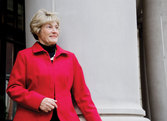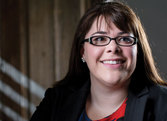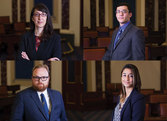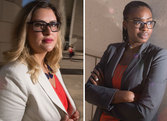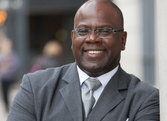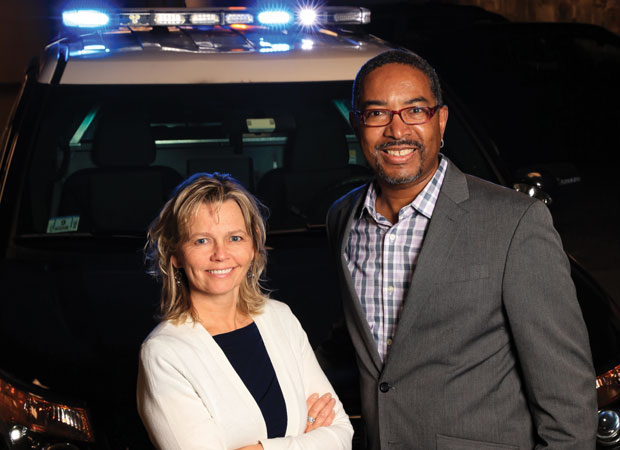
Black and Blue
Talking with two Suffolk professors on the front lines of a national conversation about policing and race
By Reneé Graham
Long before this nation began debating the incendiary issues of racial profiling and police accountability, Suffolk professors Brenda Bond and Frank Rudy Cooper had been examining the relationships between law enforcement and the communities they serve. Cooper, a professor of law, is working on a book, Black and Blue: Gendering Racial Profiling, about the role of masculinity in confrontations between police and young black or Latino men. Several years ago, Bond, an associate professor of public service and chair of the Institute for Public Service, launched the Public Safety Leadership Initiative, a collaboration between the Boston Police Department and the University to sharpen the skills of public safety executives operating within a community-policing context. Cooper and Bond recently sat down with Suffolk staff writer Renee Graham to talk about how police officers can change, why the Michael Brown killing became a catalyst, and how Boston has, so far, avoided becoming another Ferguson.
Why was the killing of Michael Brown in Ferguson, MO., the spark for Black Lives Matter and a national conversation about racial profiling and police accountability?
COOPER: A few things were special in Ferguson. One was the levels of pain that were going on there. With the Ferguson report, we found out later that there was such a pervasive exploitation of a majority black population in an environment that had a history of being a sundown town [areas where black people were warned to be gone before dark]. It was very clear that this was old-school racial oppression. So I think that was a powder keg even more than Staten Island [where Eric Garner was choked to death in July 2014 by a New York City police officer]. I would also say I put it in the context of Trayvon [Martin] and Jonathan Ferrell [unarmed young black man killed by a white police officer in North Carolina in 2013]. Any major event of injustice, given the timing, could have been the one, but given the fact that people were so righteously angry made it explode there.
If not for the police-related deaths of Michael Brown, Tamir Rice, and others, would topics like racial profiling, police accountability, and the militarization of local police departments be talking points for the presidential candidates?
COOPER: I don’t think so. In the Democratic party at least, since Bill Clinton, there’s been a sense that the black community has to give a pass to the more controversial racial issues to the Democrat because it’s so important to elect a Democrat. I think if this hadn’t exploded in such a way and produced the Black Lives Matter movement, we would have gone back to giving them a pass.
Brenda, you’ve worked closely with local police departments. From your perspective, what has been the officers’ general reaction to the increased attention on policing and racial profiling? Has there been any effect on how officers do their jobs?
BOND: They are having a lot more conversations about themselves and their behaviors. I think there is a really positive move toward more transparency. I think there’s an awareness among hopefully progressive police agencies that they have a duty and a responsibility—not just written in code—to behave and act in a way that meets the expectations of the community. I think there’s a lot more attention to training and early warning systems in terms of behavior. They’re still not where they want to be, but part of that is resources. Training costs a significant amount of money, and they’re not equipped to provide the police with as much training as they should have. Police departments have very little money for training, except for the mandated in-service training. But the conversation has changed at the leadership level.
Boston has so far avoided the kinds of issues confronted in Ferguson, Baltimore, Staten Island, Cleveland. How have the police here kept the lid on reactions to shootings that might have sparked acrimony elsewhere?
BOND: They learned a lot from Occupy Boston. They learned a lot of lessons from what happened to Victoria Snelgrove (Emerson College student accidentally killed by a Boston police officer in 2004 during a Red Sox victory celebration). I think they reflect and respond the way a police department should. They are involved in a situation, and they look at it and say, ‘What worked about that, what didn’t work.’ I think they’re good at that, and they’ve learned from those terrible tragedies like Victoria Snelgrove. With Chief [William] Gross, they are really connected to the community. I think like most places they still have work to do, but they’re trying to connect with the right folks in the community – faith-based folks, community activists.
COOPER: Boston’s black community has not been completely energized and is not very powerful when compared to other major cities. This is not a city, comparatively speaking, where every time there is an incident there is a large hue and cry against the police. Some of that, as Brenda mentioned, is that the police here are probably better at working with the community. But maybe again it’s levels of pain and we’re not in the same circumstances as Ferguson is; but by the same token, we don’t have the power and influence people have in other cities.
So much has been said and written about racial profiling and police accountability. For you, what important fact has been lost or overlooked? If you were leading this discussion, how would you change what we’ve been hearing?
COOPER: I’ve been talking about masculinity in racial profiling for a while, and that seems to have been picked up a little bit more in the national conversation. The bottom line is a lot of times we’re talking about men dealing with men, and sometimes we’re talking about men dealing with women, where the men feel they have to protect their sense of masculine esteem. So in the classic scenario where you have the beat cop dealing with young men of color, both sides may feel like they can’t lose face. And that face is associated with being a man and not being disrespected. I think that’s something the national conversation should talk about. A lot of times especially for young black males, and probably Latino males, you feel like you’re put upon in the world in general, and here comes this cop disrespecting you. The only thing you have left is the protection of your respect, in the community, and that’s a powerful motivator to act out.
BOND: I tend to look at the structural factors that play into these things: How do we understand and measure bias at the front end when someone is hired? Are we doing a good enough job around hiring and training? I tend to focus on these things because I just feel like they’re broken. This institution of policing is operating almost the same way as it did 100 years ago. How do we think about and ensure that these kinds of biases don’t come walking through the door? How do you create lifelong training and professional development for officers so that we continue to ensure that whatever they have, whatever biases, are not acted on? Or they can reconcile those biases? ...they’re trying to connect with the right folks in the community – faith-based folks, community activists.
